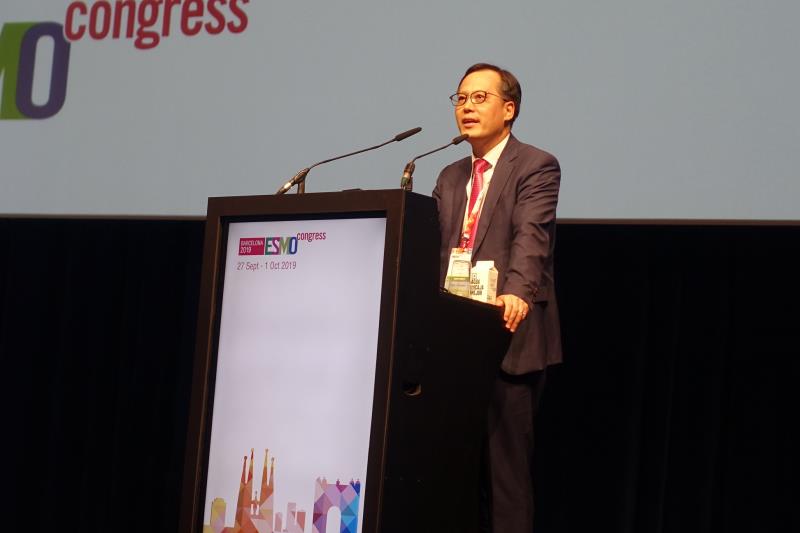 Dr Byoung Chul Cho discussing the results of ATTRACTION-3.
Dr Byoung Chul Cho discussing the results of ATTRACTION-3.The PD-1* inhibitor nivolumab showed significant survival benefit and a favourable safety profile than taxane chemotherapy in patients with unresectable advanced or recurrent oesophageal squamous cell carcinoma (OSCC) refractory or intolerant to previous fluoropyrimidine- and platinum-based chemotherapy, according to the findings of ATTRACTION-3** presented at ESMO 2019.
The 419 participants (median age 65 years, 87 percent male, 96 percent Asian) were randomized 1:1 to receive nivolumab 240 mg Q2W or chemotherapy (paclitaxel 100 mg/m² QW for 6 weeks then 1 week off or docetaxel 75 mg/m² Q3W).
At nearly 18 months, nivolumab provided superior overall survival (OS) vs chemotherapy (hazard ratio [HR] for death, 0.77, 95 percent confidence interval, 0.62–0.96; p=0.019). [ESMO 2019, abstract LBA 11; Lancet Oncol 2019;doi:10.1016/S1470-2045(19)30626-6]
“OS consistently favoured nivolumab over chemotherapy across multiple subgroups, including tumour PD-L1*** expression,” said investigator Dr Byoung Chul Cho from the Yonsei University College of Medicine in Seoul, South Korea, who presented the findings.
Evidence shows that PD-L1 expression is enriched in OSCC and could increase tumour susceptibility to elimination following immune checkpoint inhibition. [Oncologist 2018;23:1319-1327; Oncotarget 2018;9:13920-13933] Nonetheless, the findings imply that tumour PD-L1 expression level is not a determinant of OS benefit, noted the researchers.
Grade 3/4 treatment-related adverse events (TRAEs) were numerically lower with nivolumab vs chemotherapy (18 percent vs 63 percent), as were any-grade serious TRAEs (16 percent vs 23 percent). The overall safety profile remained consistent with previous evidence, with no new safety signals identified. [N Engl J Med 2016;375:1856-1867; Lancet Oncol 2017;18:631-639]
“[These results] … suggest that anti-PD-1 monotherapy offers a favourable benefit-risk profile in [this setting],” said the researchers. Given the toxicities and poor long-term survival associated with chemotherapy, [J Gastrointest Oncol 2011;2:240-249; Cancer Chemother Pharmacol 2011;67:1265-1272] nivolumab might represent a new standard second-line treatment option to address the high unmet need for patients with advanced OSCC, said Cho.
Enhanced QoL
Improvement in health-related quality of life (HRQoL) was observed with nivolumab vs chemotherapy as per EQ-5D-3L VAS# (least squares [LS] mean, 6.9; p=0.00069) and utility index (LS mean, 0.076; p=0.02). “The mean difference between groups favoured nivolumab at all timepoints and was clinically meaningful at weeks 18 through 30 (VAS) and weeks 24 through 42 (utility index),” said the researchers.
The QoL improvements boost the potential of nivolumab in addressing the QoL deterioration in OSCC due to the accompanying dysphagia, pain, and malnutrition brought about by oesophageal obstruction. [Esophagus 2019;16:25-43]
PD-1 inhibition in the second-line setting
“Taken together, [these findings confirm] that PD-1 antibody works in OSCC … In the treatment paradigm of OSCC, we need to [consider] using PD-1 antibody in the second-line [setting] … Chemotherapy will probably have to be used later,” said discussant Dr Ian Chau from the Royal Marsden Hospital in London, UK.
Long-term outcomes will be evaluated in the ongoing follow up. Post hoc evaluations will probe atypical progression patterns, while a biomarker analysis will be conducted to identify patient characteristics that might predict response to nivolumab, noted the researchers. “The higher proportion of patients with progressive disease in the nivolumab vs chemotherapy arm underlines the importance of identifying patients who are likely to respond to anti-PD-1 monotherapy.”
A phase 3 study evaluating the potential of nivolumab-based regimens as a first-line treatment option in OSCC is also underway.
A ray of hope
“These findings are important for patients, especially because of the longer duration of treatment associated with effective nivolumab therapy … [N]ivolumab might be adopted as a standard second-line treatment option for patients with OSCC who have had few options available so far,” said editorialists Dr Elizabeth Smyth from Cambridge University Hospitals NHS Foundation Trust in Cambridge, UK, and Dr Florian Lordick from University Hospital Leipzig in Leipzig, Germany. [Lancet Oncol 2019;doi:10.1016/S1470-2045(19)30621-7]
Despite the “game-changing” results, the small fraction of non-Asian participants could influence its generalizability to this population, they pointed out. It is thus important to ascertain the role of tumour or host factors (eg, including ethnicity, region of origin) in immune checkpoint blockade in oesophageal cancer, they said.
Nonetheless, this should not undermine the results which can offer renewed hope for patients with OSCC, said Smyth and Lordick. “[P]erioperative immunotherapy or combinations of immunotherapy and chemotherapy or chemoradiation might ultimately improve long-term survival in patients with early and locally advanced OSCC.”